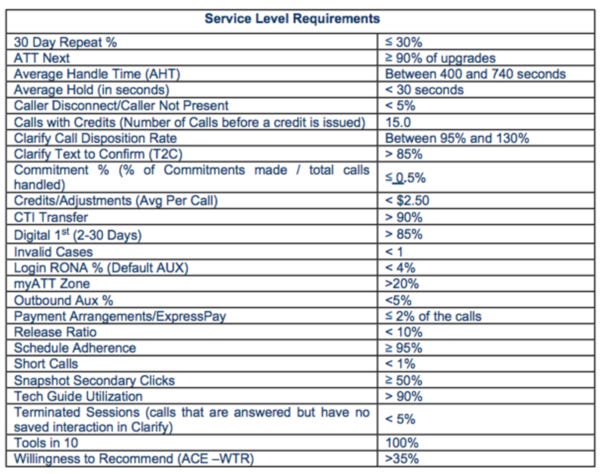Exploitive Customer Service
Do you ever come across a story in your field of work that leaves you feeling disappointed for your industry? That’s how I felt after reading the article I share below. I’m left with a feeling of “how can we make this better?”
I’m struggling to figure out how to write about the Arise story that surfaced last week. If you’re not familiar with it, the reporting was a joint venture between ProPublica (“Meet the Customer Service Reps for Disney and Airbnb Who Have to Pay to Talk to You”) and Planet Money (“Call Center Call Out”). I’ve read the article and listened to the podcast. I think you should, too.
I’m going to provide some commentary below, but really you’ll want to be familiar with the underlying story first.
Photo by Sigmund on Unsplash
"Service Level Requirements"
Source: Obtained by ProPublica
The image above, from the ProPublica article, are the service level requirements an individual Arise agent needs to meet for AT&T to keep their job. I’m trying to imagine what it would be like to be a customer service agent and have to be accountable for 25 (!) individual metrics. What concerns me about this approach is that failure to meet even a single metric constitutes a breach:
“Failure to meet any one of these 25 requirements “shall be deemed a breach,” the contract said, allowing Arise to terminate her job.”
Can you imagine calling one of the companies served by Arise agents and trying to request a refund? Forget how right you may think you are, what if the agent is close to breaching their “Average Refund per Call” metric? How hard would you advocate for a refund if you knew that if the agent granted you the refund, they could be at risk of losing their job? That seems like a recipe for both a poor customer experience and a poor employee (contractor) experience.
So what happens if an agent breaches one of their metrics? Their contract can be terminated, which Arise can do, as long as they can replace them.
Unlimited Agent Supply
And so, here you go, a “live commercial” to recruit new Arise agents airing on daytime talk show The Real. The marketing is all upside, no downside. They don’t talk about the computer you’re going to have to provide yourself, the dedicated phone line you’re going to have to install and pay for, the month of training you’re going to have pay for on your own time, or the fees to use their platform.
What really concerns me, though, is the multi-level marketing aspect of their recruiting program. The article has a helpful visual about how it works. There’s not just a relationship between Arise and the agent. There’s also the possibility of working for an independent business that exists as a middleman between Arise and the Agent. And the middleman gets paid a service fee! This creates the same network effects that you would expect from a multi-level marketing organization, where friends try to recruit friends to “be their own business owner.”
"Not a Job"
One of the main points of the reporting in the article is that Arise agents are functioning as full time employees but aren’t receiving the benefits of full time employees. Agents pay a lot of up front costs and an ongoing platform fee, which can result in earnings that fall below the minimum wage.
If you look at the comments section for the video I linked above, you’ll note the comment from the Arise Work From Home account:
All costs associated with registering and using the Arise Platform can be found here: www.ariseworkfromhome.com/costs
Please note - this is not a job - this is a home-based business opportunity.
“This is not a job.” And yet, in a slide deck promoting being an Arise agent for AT&T, the “average service revenue” is spelled out as an hourly rate, which looks an awful lot like a wage for a job. Hmmm.
It’s not just a matter of optics, though. When these cases went into arbitration, arbitrators repeatedly found that agents were functioning like full time employees and deserved to be compensated as such, rewarding agents in those cases accordingly.
But the entire Arise system hinges on agents working as full time employees (available when the company needs them) yet effectively being paid as independent contractors, at times with hourly earnings that net out to falling below minimum wage. The fact that Arise doesn’t enlist agents in states that have tighter rules protecting workers suggests they’re committed to a system that allows workers to be valued less than they would be if they were full time employees.
Serve or Exploit
The last point I’ll make is that this system is so jarring compared to what I’ve experienced in customer support in tech. In the companies I’ve worked for and have interacted with, the company takes on a much greater share of the burden. It assumes the costs of paying full time employees, providing benefits, paying for training, and accounting for “slack” time in the support queue, if and when it comes up.
Part of the fun (for me) in working in support in tech is getting to figure out how to get more output from a team by creating an environment for people to flourish. “Getting more output” can mean a lot of things. Yes, I want the team to be more effective. Yes, we’re going to meet business goals. But it can also mean getting creative about how we spend our time both in and out of the support queue. It doesn’t have to be about staying within a strict set of 25 (!) metrics or you lose your job. There must be a better way, even for businesses at a larger scale.



